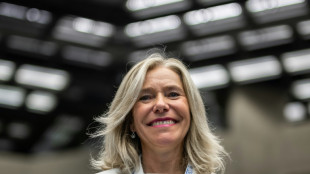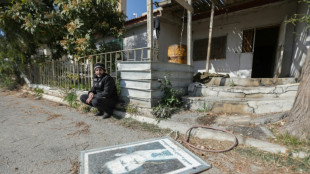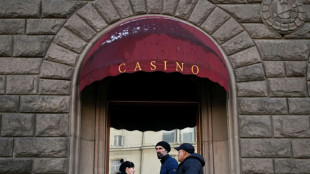
-
 Global green energy push likely to continue despite Trump climate retreat: UN
Global green energy push likely to continue despite Trump climate retreat: UN
-
Shooting, explosions in Jenin as Israel presses raid

-
 Spotlight on risk management as skiers tackle notorious Kitzbuehel downhill
Spotlight on risk management as skiers tackle notorious Kitzbuehel downhill
-
Rare wildlife species found in Cambodian national park

-
 EU Russia hawks back Trump call to boost defence spending
EU Russia hawks back Trump call to boost defence spending
-
Trump puts US govt diversity workers on leave, calls bishop 'nasty'

-
 Semi-finalist Shelton 'shocked' by 'embarrassing' Melbourne TV hosts
Semi-finalist Shelton 'shocked' by 'embarrassing' Melbourne TV hosts
-
Sinner races into semis as Swiatek closes on first Melbourne crown

-
 Syria's military hospital where detainees were tortured, not treated
Syria's military hospital where detainees were tortured, not treated
-
Prince Harry settles lawsuit against Murdoch's UK tabloids

-
 Sinner demolishes De Minaur to set up Melbourne semi with Shelton
Sinner demolishes De Minaur to set up Melbourne semi with Shelton
-
Stock markets diverge tracking Trump plans

-
 Sudan 'political' banknote switch causes cash crunch
Sudan 'political' banknote switch causes cash crunch
-
Malaysia's Anwar says don't single out China in sea tensions

-
 EU's top diplomat backs Trump call to boost defence spending
EU's top diplomat backs Trump call to boost defence spending
-
Simmering anger as Turkey begins burying 76 fire victims

-
 Masa Son, Trump's Japanese buddy with the Midas Touch
Masa Son, Trump's Japanese buddy with the Midas Touch
-
Borussia Dortmund sack Sahin after Champions League setback

-
 US govt workers in diversity jobs to be put on leave as programs ordered shut
US govt workers in diversity jobs to be put on leave as programs ordered shut
-
Shelton grinds past Sonego into Australian Open semi-final

-
 Borussia Dortmund sack coach Nuri Sahin after Champions League setback
Borussia Dortmund sack coach Nuri Sahin after Champions League setback
-
Markets rise after Trump AI pledge but China tariff fears return

-
 'Did not push hard enough': Navalny lawyer speaks of regrets
'Did not push hard enough': Navalny lawyer speaks of regrets
-
Bulgaria court ruling turns spotlight on gambling addiction

-
 Inoue focused on Korean with bright lights of Vegas on horizon
Inoue focused on Korean with bright lights of Vegas on horizon
-
Mauricio Funes: journalist turned El Salvador president

-
 Navarro urges rule change after double-bounce furore in Melbourne
Navarro urges rule change after double-bounce furore in Melbourne
-
Asian traders cheer Trump AI pledge but China tariff woes return

-
 Lesotho's king pitches green energy to Davos elites
Lesotho's king pitches green energy to Davos elites
-
Buttler rejects calls for England to boycott Afghanistan match

-
 'I believe': Swiatek surges into Australian Open semi with Keys
'I believe': Swiatek surges into Australian Open semi with Keys
-
Indonesia rescuers search for survivors as landslide kills 19

-
 Triple-doubles for Jokic and James fuel lopsided NBA wins
Triple-doubles for Jokic and James fuel lopsided NBA wins
-
Five things about the 2025 World Rally Championship

-
 'Love for humanity': Low-crime Japan's unpaid parole officers
'Love for humanity': Low-crime Japan's unpaid parole officers
-
Indonesia rescuers search for survivors as landslide kills at least 17

-
 Trump targets opponents, faces criticism from cathedral pulpit
Trump targets opponents, faces criticism from cathedral pulpit
-
S. Korea to overhaul some airports after Jeju Air crash

-
 Resilient Keys 'really proud' to be back in Melbourne semis
Resilient Keys 'really proud' to be back in Melbourne semis
-
Bloodied Welsford fights back from crash to win another Tour stage

-
 Swiatek sweeps into Melbourne semis, Sinner faces home test
Swiatek sweeps into Melbourne semis, Sinner faces home test
-
Rampant Swiatek sweeps into Australian Open semi-final with Keys

-
 Lanterns light up southern Chinese city ahead of Lunar New Year
Lanterns light up southern Chinese city ahead of Lunar New Year
-
'Worst ever' Man Utd turn to Europa League as saving grace

-
 Brazil saw 79% jump in area burned by fires in 2024: monitor
Brazil saw 79% jump in area burned by fires in 2024: monitor
-
Resilient Keys beats Svitolina to reach Australian Open semi-finals

-
 Most Asian markets rise after Trump AI pledge but China tariff woes return
Most Asian markets rise after Trump AI pledge but China tariff woes return
-
Djokovic mentally ready for Zverev but worried about creaking body

-
 As Trump takes aim at EVs, how far will rollback go?
As Trump takes aim at EVs, how far will rollback go?
-
No home, no insurance: The double hit from Los Angeles fires


Sudan 'political' banknote switch causes cash crunch
Sudan's army-aligned government has issued new banknotes in areas it controls, reportedly aimed at undermining its paramilitary rivals but causing long queues at banks, disrupting trade and entrenching division.
In a country already grappling with war and famine, the swap replaced 500 and 1,000 Sudanese pound banknotes (worth around $0.25 and $0.50 respectively) with new ones in seven states.
The government justified the move as necessary to "protect the national economy and combat criminal counterfeiters".
But for many Sudanese it just caused problems.
In Port Sudan, now the de facto capital, frustration boiled over as banks failed to provide enough new notes.
One 37-year-old woman spent days unsuccessfully trying to get the new money.
"I've been going to the bank four or five times a week to get the new currency. But there is none," she told AFP, requesting anonymity for fear of reprisals.
Grocers, rickshaw drivers, petrol stations and small shop owners are refusing to accept the old currency, preventing many transactions in a country reliant on cash.
"We cannot buy small things from street vendors any more or transport around the city because they refuse the old currency," the woman said.
The currency shift comes 21 months into a war that has devastated the northeast African country's economy and infrastructure, caused famine in some areas, uprooted millions of people and seen the Sudanese pound plunge.
From 500 pounds to the US dollar in April 2023, it now oscillates between 2,000 and 2,500.
- The upper hand -
Finance Minister Gibril Ibrahim defended the switch, saying it aims to "move money into the banking system, ensure the monetary mass enters formal channels as well as prevent counterfeiting and looted funds".
But analysts say it is less about economics and more about gaining the upper hand in the war between army chief Abdel Fattah al-Burhan and his former deputy Mohamed Hamdan Daglo, who leads the paramilitary Rapid Support Forces (RSF).
"The army is trying to weaken the RSF by having a more dominant currency," Matthew Sterling Benson at the London School of Economics and Political Science told AFP.
After the RSF looted banks, the army "wants to control the flow of money" and deprive them of resources, he said.
Sudanese researcher and political analyst Hamid Khalafalla said the army also wants to bolster its war chest.
He said the funds "will definitely be used by the army to finance the ongoing war, including paying soldiers and procuring arms from various countries".
The RSF has banned the new notes in areas it controls, and accused the army of orchestrating a "conspiracy to divide the country".
Kholood Khair, founder of think tank Confluence Advisory, believes that this financial squeeze may accelerate RSF plans to establish a rival currency and administration.
"The move has catalysed the already existing trajectory towards a split," she told AFP.
Sudan is already fragmented: the army holds the north and east and the RSF dominates in the western Darfur region and parts of the south and centre.
Greater Khartoum is carved up between them.
- No-win situation -
For Sudan's population, the move has only compounded their suffering.
Activist Nazik Kabalo, who has coordinated aid in several areas, said supply chains have been severely disrupted.
Farmers, traders and food suppliers rely entirely on cash.
"And if you do not have cash, you cannot buy supplies, needed for aid or for anything else," Kabalo told AFP.
The government has promoted digital banking apps such as Bankak, but many Sudanese cannot access them because of widespread telecommunications outages.
The RSF could be left virtually unscathed, as it deals mostly in foreign currency and has a transnational support network spanning Libya, Chad and the Sahel.
In RSF-held areas, civilians could become further isolated economically, struggling to trade with regions under army control.
"And this is a bad situation when people are at risk of famine, and you need to be able to buy food," Benson said.
Last month, the UN-backed Integrated Food Security Phase Classification review said famine has gripped five areas in Darfur, mostly controlled by the RSF, and parts of the Nuba Mountains in the south.
For Khair, the army and RSF are just trading blows "to score political points".
"It's about creating a governance crisis for the RSF, starving people of currency and services so they turn against their rulers," she said.
"The army introduces a currency and blocks people in RSF areas from services. In response, the RSF talks about creating their own."
M.A.Colin--AMWN